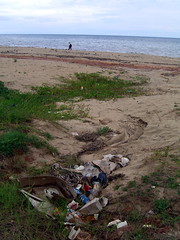Littering isn't littering in Honduras. To us, just the word has all sorts of negative connotations. None of that exists here. Littering is as normal as breathing. Everyone does it, without thinking. It's such a huge problem that a during a rainstorm a couple months ago, trash clogged the storm sewers in Tegucigalpa and caused widespread flooding.
Is it simple a lack of education and socialization that causes this? Partly, yes. Parents litter and kids copy their parents. But as with most problems in Honduras, the full answer is more complicated. The litter problem in Trujillo is a microcosm of the development challenges in Honduras as a whole.
In Trujillo we have municipal garbage collection in and around the center of town. There are public garbage cans on almost every street corner in a three block radius around the central park. That area of town (where there are garbage cans and weekly collection) is much cleaner than the rest of Trujillo. Most places in Honduras (even big cities) do not have public trash cans or regular garbage collection. It's like living in a city where the sanitation workers are permanently on strike, and hooligans have stolen all of the trash cans from the street corners. The images coming out of Oakland during their recent garbage strike showed how important these services are.
Of course, in Oakland the trash was piling up in specific areas (in and around overflowing dumpsters and trash cans). In general, people were putting the trash where it was supposed to go. Here in Trujillo, I've seen people toss empty soda cans into the street when they were less than 10 feet from a trash can (and don't even get me started on recycling). What is the solution to this? Some would say that it's the responsibility of parents to teach their kids how to behave like responsible citizens. I agree, but what should a society do when private citizens are failing to get the job done? That is when the government should use its resources to promote socially responsible behavior. Providing the cans and collection services is a definite prerequisite. On top of that, a carrot-and-stick campaign of education and enforcement should be waged to get people to change their behavior.
But here in Honduras, that is anything but simple to do. There's a sign on a bridge in Cristales that reads, "Don't throw garbage in the river. 1,000 Lempira fine." The banks of the river right below that sign are literally buried under garbage. As far as I can tell, this sign is the entire anti-littering campaign by the local government. There are no PR or education campaigns, and there is no enforcement of littering laws. Why is there no enforcement? Well, first of all, there is no blanket anti-littering law for the municipality, or if there is then nobody knows about it. Secondly, police officers don't patrol the city, so they can't spot litterbugs and cite them. Even if the police officers did patrol and cite people, hardly anyone could pay even a modest fee, and the paperwork overhead would swamp the officers. Most likely, it would become another way to for the police to extract bribes.
Lastly, there seems to be no political will to actually implement hard-hitting measures to effect change. Mayors often spend most of their time currying favor with influential citizens through backroom quid pro quo deals. They spend the entire year before the election campaigning and spreading money around to garner key endorsements. This leaves little time or money for projects that would actually improve life for the majority of citizens.
There are no doubt even more barriers to resolving the litter problem than the ones I can see. And this is just littering. Much deeper and more serious problems exist with security, education, health, and poverty. The interconnectedness of the causes and effects of these problems is so great that it just makes your head spin.
Tuesday, August 7, 2007
Subscribe to:
Post Comments (Atom)





4 comments:
Paris was having a garbage strike when I was there in '97, which was much like the recent one in Oakland (garbage piled up in respective areas). However, they didn't have the law we have here about picking up after your dog, so there was shit everywhere. It's sad that people need laws to keep them from doing obviously disrespectful things. You'd hope that a person could contemplate the consequences of their actions and learn to self govern. And you'd hope those running a government would be more concerned with improving conditions than securing popularity. How do you get people to think critically for themselves while instilling in them a duty to humanity?
I wrote a similar article about the trash problem back in November that you might be interested in:
Trash everywhere
Actually, I searched for "trash" on my blog and came up with a bazillion articles. It really is a big problem and currently is probably having an effect on the dengue epidemic since mosquitoes can lay their eggs in the rain puddles being held by the plastic bags and food containers.
I'm enjoying your blog. Thanks!
Nice table! You might consider painting it so that possibly it won't be so attractive to termites. We had a huge problem with termites coming into our garage to feast on the homemade shelves.
I was driving behind a "garbage truck" the other day here in SPS. It was open on the top and back. There was a very large, but defective worn out tarp thrown over. Trash was blowing everywhere.
Downtown SPS has enacted some clean up programs recently. They kicked out all the street vendors and put out colorful trash cans. Also encouraging businesses to paint and tidy up their store fronts. There was a few articles about it in La Prensa a few weeks ago.
Post a Comment